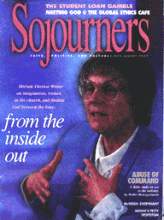The presidents' summit on volunteerism, held with much fanfare this spring in Philadelphia, presented the churches with a dilemma. On the one hand, many church leaders rightly castigated Bill Clinton for his so-called "welfare reform," which took enormous sums from those least fit either to afford it or prevent it from happening.
On the other hand, the church is a strong thread in the fabric of civil society, a necessary participant in any forum that purports to be a comprehensive addressing of such issues. But was the church just to provide volunteers to make up the missing millions? Become foot soldiers for Gen. Colin Powells new army? Concerning the summit, the choice for many was righteous withdrawal or impure involvement.
It turned out that the very issue of division became the catalyst around which to unite. The iniquitous welfare deal demanded a correspondingly great prophetic response. On April 26, the day before the volunteerism summit, the Call to Renewal invited more than 50 leaders of churches and religious groups from across the political spectrum to a common tablea real, physical oneto outline alternative ideas for alleviating poverty. The discussion"The Church Steps Forward: A Christian Roundtable on Poverty and Welfare Reform"focused on principles, practices, and policies to end poverty.
Read the Full Article
